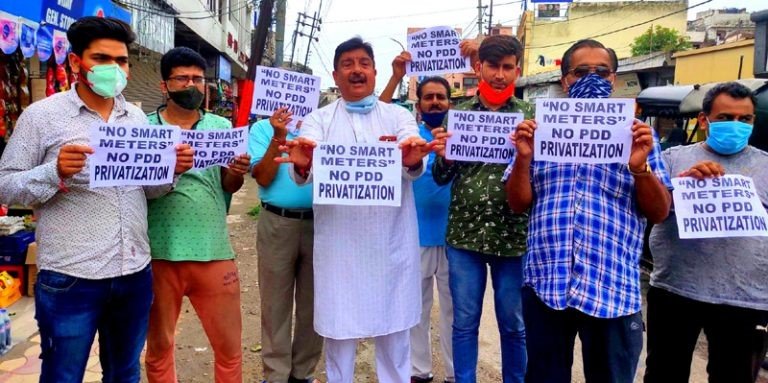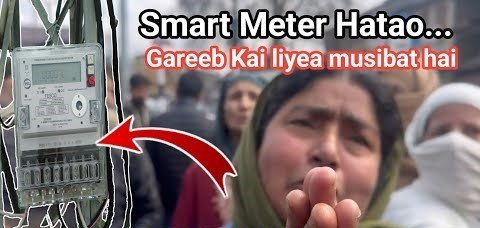An anti-worker scheme
By Kamgar Ekta Committee (KEC) team of volunteers

In Parts 1 and 2 of this series, we have seen how the smart meter scheme will greatly benefit private electricity companies at the cost of consumers. In this part we will see how power sector workers will be hit badly. They will be doubly hit, firstly, as users of electricity , because like other consumers, they will have to pay exorbitant power bills and secondly, as workers due to privatisation of Discoms.
The government is asking electricity workers to support the installation of prepaid smart meters as they would be spared the wrath of consumers when they go to collect pending bills or go to disconnect power in cases of over-due bills. However, the benefit is likely to be short-lived as many of these employees are likely to lose their job soon after the smart metering system is operational. The entire billing and collection along with all activities connected with metering will be handled by the private company installing smart meters. In just one state of Tamil Nadu, unions estimated that nearly 20,000 workers will be affected.
Power sectors workers will be further hit when Discoms are privatised. Privatisation has invariably led to loss of job security, large-scale replacement of permanent jobs with contractual jobs and curtailment of workers’ benefits. Public sector workers cannot afford to forget the learnings from privatisation of Air India. The existing terms of employment were guaranteed only for one year after privatisation. The Tata group introduced three voluntary retirement schemes (VRS) within one year of taking over Air India. Employees know how much ‘voluntary’ is VRS in a private company!
It is no surprise that several unions of Electricity workers are opposing the scheme as the pre-paid smart meters would lead to the loss of substantial number of jobs related to metering and billing.
Another argument given to win the support of workers is that the prepaid smart meter installation will lead to reduction in theft of power. That will lead to improvement in the financial health of their distribution company.
Power sector workers are not responsible for the poor financial condition of Discoms. It is the policies of central and state governments which have crippled Discoms. They have been forced to sign Power Purchase Agreements (PPAs) at highly favourable terms to private Gencos (Generation companies) at the cost of both Discoms and consumers. Under these PPAs, Discoms have to pay the Gencos even when they have not taken any electricity from them!
Moreover, we workers should challenge the thinking that electricity should be profitable. Basic services like electricity, transport, supply of water, health, education and sanitation services cannot be regarded as a source of profit!
The government is giving up its responsibility to ensure basic services to everyone at an affordable rate. The government collects taxes only because it has the duty of ensuring a good life for all. Indirect taxes are paid by all, no matter how poor they are. They form the largest fraction of taxes.
We workers must insist on policies which would ensure no citizen of the country is deprived of the electricity.

The smart metering scheme will deprive many people of our country of electricity, a basic necessity in today’s life. As responsible citizens and being true to the international call of the working class, “An Attack on One is an Attack on All!”, we workers must uphold the interests of our fellow Indians.
It is clear that the real objective of the prepaid smart metering scheme and other components of the Revamped Distribution Sector Scheme (RDSS) is to make electricity distribution attractive for privatisation. The fact that the government is insisting on the PPP mode for installation of smart meters makes the real aim even more evident.
Consumers and power sector workers cannot afford to get fooled by claims of Central and state governments. The smart meter scheme is nothing but a ‘smart’ step towards privatisation of electricity distribution. Electricity will become a means of profiteering once it is fully privatised.
Power sector workers, farmers as well as workers from other organisations, have, through their united actions, succeeded so far in thwarting the repeated attempts of the central government to pass the Electricity Amendment Bill (EAB), aimed at privatising electricity distribution. The threat of the EAB 2022 has not gone away as it has been referred to the Parliament’s Standing Committee for Energy.
In order to circumvent the parliamentary approval, the central government is amending the Electricity Rules and introducing schemes like the RDSS to enable privatisation.
Pre-paid smart meters are neither in the interest of power sector workers nor in the interest of consumers of the country. They will only benefit big corporates who now wish to control the entire power system of the country for maximising their profit.
Power sector workers have demonstrated exemplary unity under the banner of the National Coordination Committee of Electricity Employees and Engineers (NCCOEEE) to oppose various attempts of privatisation of the power sector. The NCCOEEE has rightly noted that the installation of prepaid smart meters would lead to curbing the rights of universal access to electricity.
The nefarious attempt of the government to privatise electricity distribution through the back door by installing prepaid smart meters must be defeated by making every worker and consumer aware of how it will hurt them and by mobilising them against it.
